#joseph fouche
Explore tagged Tumblr posts
Text

It's been so long since I drew him. It was nice to draw him again.

#art#history art#french history#french revolution#history#frev#joseph fouché#joseph fouche#fouche#i love fouche and what 🗿#god help me
169 notes
·
View notes
Text
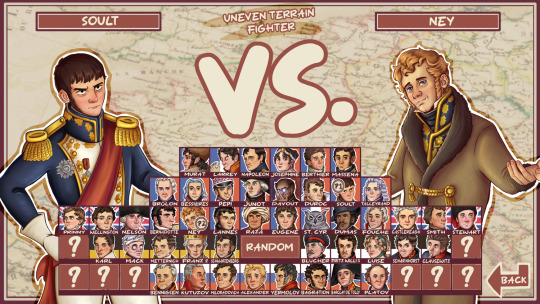
Oh, the things I would do for a Napoleonic themed fighting game...
Feel free to suggest some more characters in case I ever finish this. I was kinda running out of ideas 😅
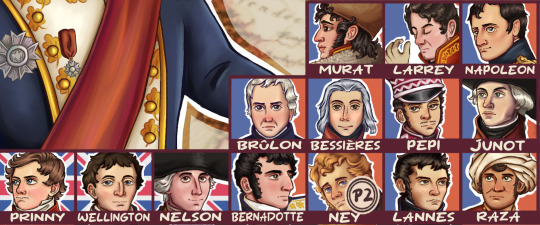
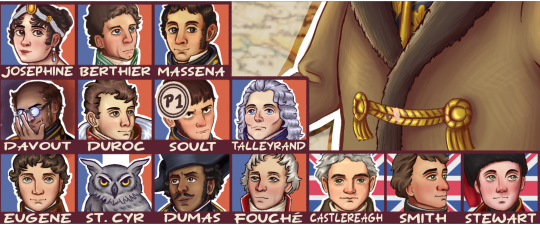


#artists on tumblr#my art#napoleonic wars#napoleonic era#jean de dieu soult#michel ney#napoleon bonaparte#alexander i of russia#joachim murat#arthur wellesley#jean lannes#pyotr bagration#jean andoche junot#joseph fouche#klemens von metternich#what am i thinking trying to tag them all lmao#poor mack would 100% be a joke character
331 notes
·
View notes
Text

画了一个小时……压力太大了,不知道又要什么时候画完了
33 notes
·
View notes
Note
Could you draw Fouché and Tayllerand together, doing what they do best, that is being toxic?
like britney spears , right ?
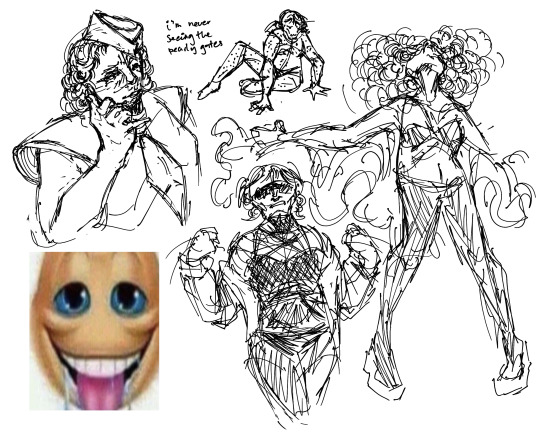
#frev#french revolution#napoleonic era#art#my art#doodle#ask#i am so fucking sorry#Charles Maurice Talleyrand#joseph fouche#i did this in like 10 minutes i ' m so sorry
19 notes
·
View notes
Text
so i was talking with my mom (a historian) about the afterlife and how historical figures having to share apartments would be hilarious. And then i brought up the frenchies, and what they would be doing after death.
I present to you, my mom's thoughts on the matter:
They would be running a spa. All of them. Lavoisier and his wife would be running the cafe (are there cafes at spas??? I don't know??? I was too busy dying inside to ask). Fouche runs finances. Robespierre does hairdressing stuff and danton does pedicures. Herault would be the (female?) waitress and fabre is the apothecary?? I guess? (I think my mom meant he runs the front desk) Louis XVI would be the janitor and marie Antoinette takes care of pets.
And i vetoed charlotte corday to ever be there. That was all i got to say.
And napoleon is just there to help
#If i had to hear my mom explain to me this in graphic detail#You must read this cursedness so I don't suffer alone#Marat was also here somewhere but i spared him the suffering he deserves a day at the spa not to work at one#Anyways time to tag all these frenchies#I'm sure they won't haunt my ass for this sacrilege#Lavoiser#joseph fouche#maximilien robespierre#Danton#hérault de sechelles#Fabre d'Eglantine#Louis XVI#marie antoinette#Napoleon#No i won't tag corday cause fuck her that's why#I'm sorry for inflicting this upon you all I wanted was to talk with my mom about quevedo and gongora having to share a flat but alas
23 notes
·
View notes
Text
i ' m girls . these are my beautiful wives





Girls will say "this is my beautiful wife" and their beautiful wife is just a weird looking man
#maximilien robespierre#joseph fouche#Jean - Marie Collot d ' Herbois#aaron burr#james fitzjames#autism creatures
16K notes
·
View notes
Text
Joseph Fouché Post Thermidor:

#french revolution#robespierre#frev#joseph fouché#fouche#hes galloping to gloat to charlotte btw#tw: thermidor#:(
154 notes
·
View notes
Text
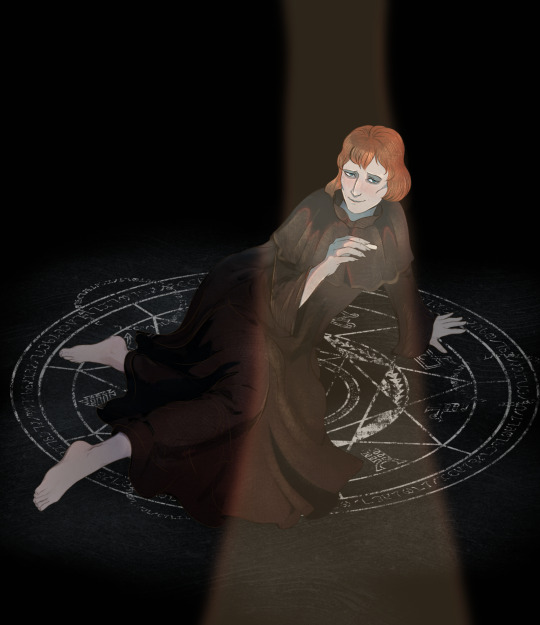
Comission for @usergreenpixel again xD
A short story with a headcanon that Fouche practiced alchemy in a monastery
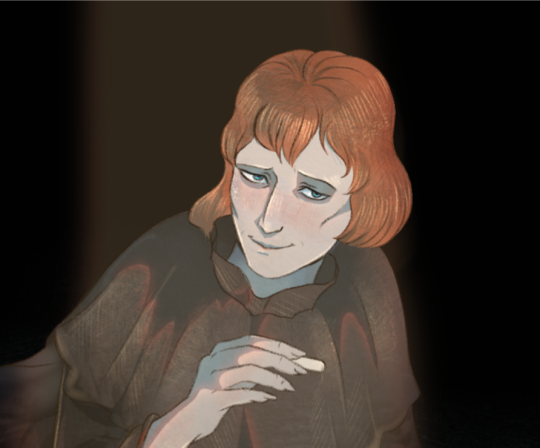
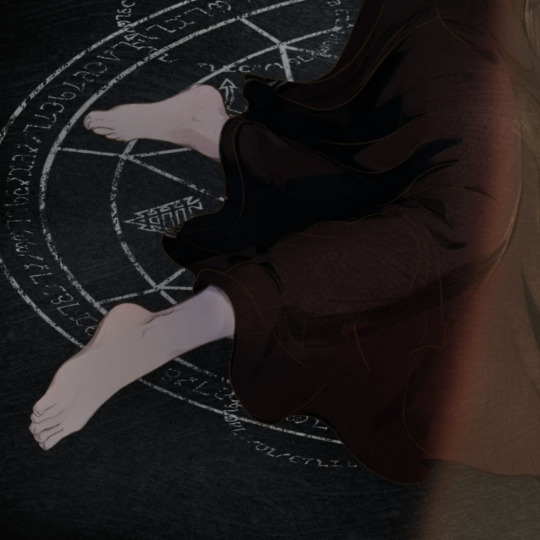
#history art#art#napoleonic#french revolution#frev#19 century#french history#18th century#joseph fouché#fouche#Joseph Fouche#hehe fouché again#yes i draw fouche again#history au#frev art
104 notes
·
View notes
Text
Bruh
73 notes
·
View notes
Note
This is an addition to my first answer for @joachimnapoleon and relates to an article by André Gavoty from the Revue des Deux Mondes, 1 July 1957. It does not have much Fouché in it, but at least some, and much more about another high ranking member of Fouché’s police (whom, funnily enough, I had already "met" in Nicole Gotteri's book, during Soult’s troubles in Portugal and Spain), Pierre-François Denis de Lagarde. But mostly it concerns a lady about whom Napoleon, on 27 July 1805, i.e. during Eugène’s first days as viceroy, felt the need to personally scribble the following message:
Saint-Cloud, 8 thermidor year XIII. I am informed that you are in correspondence with a woman called Dervieux. I don't know if you know that this lady is just a girl [meaning, I presume; unmarried], a schemer who has often been used by the police. A woman like that should not receive letters from you: that's the filth of Paris! I think I should warn you about this so that it serves you as a guideline.
As this is, as stated above, a letter by Napoleon in his own handwriting, there is actually some confusion about the name of the lady. An older historian had read "Derviez", Gavoty however claims it must be "Dervieux" and identifies her as Louise-Jeanne-Nicole-Arnalde Denis de Trobriand, sister to one of Davout’s ADCs, married (yes, indeed, Sire!) since 1791 to one Barthélemy Dervieu(x) Duvillar(s/d) – seriously, the spelling issues in this era kill me! - or du Villar(s/d), and best known as Fanny du Villars, cousin to South-American hero of independence Simon Bolivar. Hence the title of Gavoty’s article.
I had already read that Fanny was supposed to have had two children from Eugène (apparently according to family lore) but this is the first detailed description of their relationship. Though Gavoty does not really add much when it comes to this particular aspect.
Now, according to Gavoty, the rather brutal reproach by Napoleon cited above had been due to an intrigue by Fouché. During the Consulate, Fanny du Villars had been one of many salonnières, belonging to and moving in the same circles as Madame Recamier, i.e., wealthy bourgeois, not necessarily happy about the idea of an empire and increasingly in opposition to Napoleon’s plans. Eugène had frequented her salon and actually had been friends with both her and her lover Lagarde. When Eugène became viceroy in Milan, Fanny sent him a letter of congratulations along with the request to find a lucrative post for their common friend Lagarde. Eugène did indeed ask Napoleon to employ Lagarde as chief of police in the Kingdom of Italy, and he also sent Fanny some "friendly replies" to thank her for her congratulations.
[See, Murat? That’s how it’s done! - Sorry, couldn’t help myself. That correspondence will never cease to amuse me.]
Anyway, that "friendly reply" was apparently the correspondence that had caused Napoleon’s outburst. As Gavoty relates, before employing Lagarde, Napoleon had asked the opinion of Lagarde’s boss, Fouché. And Fouché was on one hand very eager to have one of his men in Italy in order to keep him informed, but on the other hand he feared the close personal relations between Lagarde and Eugène. And so he denounced both Lagarde (a bit) and Fanny (a lot) to Napoleon, making sure that Napoleon would not want to see Eugène in contact with either of the two.
We actually have Napoleon’s response concerning Lagarde in DuCasse’s publication of Eugène’s letters (tome 1):
Saint-Cloud, 27 July 1805 […] I have just given orders for Monsieur Lagarde, who works for the Minister of Police, to go and see you. He is a man who has played many roles; in short, a police officer. Keep him at a distance and only communicate with him through Méjean. Stick to what I tell you, and not to your twenty-year-old heart. For four years I have used him a lot in the police, and I have never seen him: that is not absolutely what you should do too; but, if you see him four times in a year, that is enough. Be careful not to let your opinion show; on the contrary, he must believe that you are concerned about him. […]
As to Eugène’s reply to Napoleon’s letter about Fanny du Villars, Gavoty quotes it, too:
Milan, 9 August 1805 [...] This morning I received a letter from Your Majesty in the post. I thank Him for the advice He has been kind enough to give me with regard to Madame de Dervieux. I must also inform Your Majesty that this is Lagarde's mistress and that she is going to accompany him to Italy. Your Majesty may rest assured that I will take advantage of the advice He has been kind enough to give me […]
I’m not sure in how far this is polite Beauharnais speak for "Thanks, up yours". But I agree with Gavoty that Eugène clearly takes great pleasure here in informing Napoleon about a detail that Fouché likely had forgot to mention: Lagarde and Fanny being lovers, and the depraved woman Eugène was not allowed to write to thus soon coming to Milan. Eugène also makes a point in calling her "Madame".
Actually, she’s very much married, Naps! She just doesn’t care, you know?
Presumably, his imperial stepfather was aghast at this Sodom and Gomorrha surrounding his stepson. And so was, a couple of months later, apparently the new vice-queen, a certain "prudish" princesse Auguste of Bavaria. By that time, Fanny and Lagarde had moved on to Venice and had found a suitable third for a happy ménage-à-trois in the French consul at Venice, Julien Bessières, a cousin of Eugène’s friend, the marshal. Eugène around this time apparently wanted to see Julien replaced, though I am unsure if this really was due to Auguste or in any other way related to Julien’s personal relations with Fanny and Lagarde. I know there is some correspondence detailing Eugène’s conflict with Julien Bessières but I have not checked for more information.
Just wanted to share this bit, as little as it is.
Hello! I was wondering if you’ve ever come across anything regarding Eugène’s relationship with Fouché? I was just browsing Hortense’s memoirs and she off-handedly mentions that Fouché disliked Eugène. It’s the first time I’ve seen either mentioned in regard to the other so now I’m curious. Here’s the excerpt; the “attempt” in question was when Friedrich Staps tried to murder Napoleon in 1809:
“The generals and other officers, shocked that such an attempt should have been made and alarmed at the idea of what might have happened, had considered seriously the situation arising from the absence of any direct heir to the imperial throne. They debated who might have been chosen as the Emperor’s successor had the attempt succeeded, and unanimously voted for the Viceroy. Public opinion throughout France indorsed the verdict. Rumors of this reached the Emperor and displeased him. They revived all his ideas concerning a divorce and later caused him to say to me during one of our conversations: “It became a necessity; public opinion demanded it.” I believe also that Fouché, with his skill for intrigue and dislike for my brother, took advantage of the episode to bring the matter of a divorce again to the Emperor’s attention. He perhaps even mentioned that my mother and I were deliberately engaged in promoting Eugène’s popularity.”
Hi, and thank you for the Ask! 💖
Of the top of my head, I could not point my finger to any particular interaction between the two, neither negative nor positive. Once Eugène was in Milan, while Fouché stayed in Paris, there was barely a chance for them to be at odds with each other, at least directly. And before that, Eugène simply had not had a high enough rank (officially) to be of much importance.
That Eugène was not fond of Fouché, especially after Fouché had tried to talk Josephine into a divorce in 1807, that I will believe. Josephine wrote to Eugène in detail about it. When Fouché in 1813/4 went on his mission to Italy, he not only saw Murat but also Eugène, and in his memoirs he (or whoever wrote in his name) claims that only after Fouché had explained it to him did Eugène understand that his future, too, was in jeopardy should Napoleon fall (which, I believe, is somewhat contradicted by Eugène's own correspondence with Auguste and their constant worries about the future of their children).
And then, during the second Restauration, Fouché, on the run and kicked out of France, asked Eugène for protection and an asylum in Bavaria. Which Eugène politely but very firmly declined. And that's rather unusual, for him.
As to the events Hortense relates in her memoirs, being the malicious person that I am I always read that a little differently 😊:
First of all, I assume it to be blown somewhat out of proportion, with Hortense trying to give Eugène more importance than he truly had. Though, in fairness, there are Austrian sources that point in the same direction, so something may really have gone on in the army (Napoleon's main base of support!). That there was a huge portion of dissatisfied men and officers ever since the Polish campaign, that much at least seems to be clear (the "Roi Nicolas" affair in Portugal, with several high-ranking officers either conspiring with the enemy or at least revolting against Soult, happens almost at the same time). It's possible that they (or some of them) picked Eugène as a rallying figure, as somebody who might bring some calm and restraint for the future.
And secondly, I always understood this to mean that Josephine and Hortense of course really had intrigued on Eugène's behalf and tried to win public support for the idea of Eugène as Napoleon's successor. Fouché had reported to Napoleon about it - as was his job! -, Napoleon had not taken it well (as was to be expected), and now Fouché was an enemy of Eugène's in the eyes of Josephine and Hortense 😁. (Napoleon did react badly to all signs of Eugène gaining a reputation of his own at this time, there's also Eugène's panicked reaction about a book someone had written about his campaign and that he had not managed to seize in time before it reached Paris. And as to Hortense and Josephine pushing Eugène into the limelight, there is another incident during the Russian campaign, when an account of the Battle of Malojaroslavetz praising Eugène and the Army of Italy to the sky "accidentally" found its way into a French newspaper...)
So, from the little evidence we have, I'd argue Fouché was rather Josephine's enemy, and only in extension that of Eugène (Eugène being designated as Napoleon's successor would of course have resolved the question of a divorce forever). If he acted in opposition to Eugène, it surely was in accordance with Napoleon's plans (which may or may not have coincided with Fouché's own).
As usual, I wish I had a better answer. But I'll pay attention from now on, maybe I come across some more actual interaction between the two in the future. Thanks again for the Ask!
#napoleon's family#eugene de beauharnais#napoleon's court#joseph fouche#fanny du villars#pierre-francois de lagarde#milan 1805#italy 1805#paris 1805
43 notes
·
View notes
Note
Fouche and Talleyrand toxic yaoi!! Pleaseee...🙏
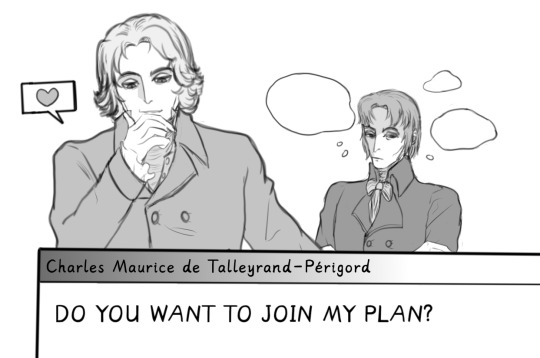
62 notes
·
View notes
Text
Fouché goes Royalist hunting
(from Carême ep. 6)
The dramatic music! The gestures!! This is peak cinema!!! ...
Anyway, now some gifs that, again, I simply couldn't not do





56 notes
·
View notes
Text
I watched "La terreur et la vertu: Robespierre" with my cousins and their ending notes were, "That guy Fouché is such a snake"
72 notes
·
View notes
Text

70 notes
·
View notes
Text
Inspired by La Terruer et la Vertu
111 notes
·
View notes
Text
Rare Chéché portrait

Don't bother him, he's doing his homework
From Le Grand amour de Fouché : Ernestine de Castellane, 1931
75 notes
·
View notes